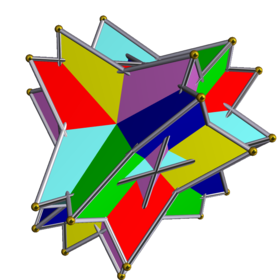Compound of six tetrahedra with rotational freedom
Appearance
| Compound of six tetrahedra with rotational freedom | |
|---|---|

| |
| Type | Uniform compound |
| Index | UC1 |
| Polyhedra | 6 tetrahedra |
| Faces | 24 triangles |
| Edges | 36 |
| Vertices | 24 |
| Symmetry group | tetrahedral (Td) |
| Subgroup restricting to one constituent | 4-fold improper rotation (S4) |
This uniform polyhedron compound is a symmetric arrangement of 6 tetrahedra, considered as antiprisms. It can be constructed by superimposing six tetrahedra within a cube, and then rotating them in pairs about the three axes that pass through the centres of two opposite cubic faces. Each tetrahedron is rotated by an equal (and opposite, within a pair) angle θ. Equivalently, a tetrahedron may be inscribed within each cube in the compound of six cubes with rotational freedom, in such a way as to preserve tetrahedral symmetry.
When θ=0, all six tetrahedra coincide. When θ is 45 degrees, the more symmetric compound of six tetrahedra (without rotational freedom) arises.
References
- Skilling, John (1976), "Uniform Compounds of Uniform Polyhedra", Mathematical Proceedings of the Cambridge Philosophical Society, 79 (03): 447–457, doi:10.1017/S0305004100052440, MR 0397554.
